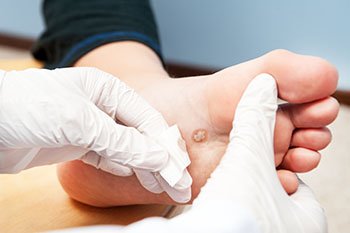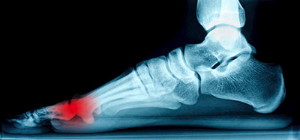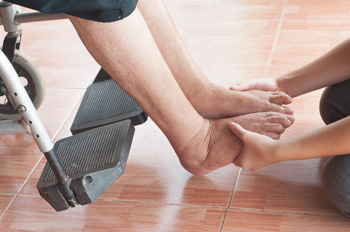April 2021
What to Look For When Inspecting Your Feet
People are often prone to developing foot problems as they age. Seniors are at an increased risk for many foot conditions, including dry skin, calluses, corns, blisters, ingrown toenails, deformities such as hammertoes and bunions, fungal skin and nail infections, and foot warts. Sometimes, even seemingly harmless foot conditions can progress and lead to serious consequences. For example, an ingrown toenail can become infected or create a wound that heals slowly due to other underlying health conditions, such as diabetes. Therefore, it is important for seniors to monitor the health of their feet by regularly inspecting them. Look for any abnormalities in the feet, such as sores, scrapes, cuts, or wounds, skin discoloration, pain or strange sensations like tingling or burning. If you notice any changes to your feet, please consult with a podiatrist.
If you need your feet checked, contact Dr. John C. Lawlor of Florida. Our doctor will attend to all of your foot and ankle needs and provide you with quality treatment.
Geriatrics and Podiatry
When people age, some common issues that may occur are bone density loss, dry skin, poor circulation, and rough brittle nails. These issues may also affect your foot health if the necessary steps are not taken to alleviate the problems.
It is important to take care of your feet because feet that are injured or diseased can affect your overall health. Having painful feet hinders your ability to do daily activities or may decrease your willingness to do the things that you need to do.
Visiting Your Geriatrician
As we age, health problems become more likely, so it is essential to visit your doctor for check-ups to ensure that you are doing the best you can to take care of your health. It is recommended to check your feet frequently for any possible cuts, bruises, swelling, corns or any other irregularities.
Taking Care of Elderly Feet
Cracked or dry feet can be treated by applying moisturizer often. It is also important not to wear old socks because the older the sock is, the higher the possibility there will be that there is bacteria there. Wear fresh socks and make sure they fit properly.
Proper foot health means that you can have a more active lifestyle and you will not be bogged down by pain. Foot health also leads to good circulation, which is paramount for overall health.
If you have any questions, please feel free to contact one of our our offices located in Cape Coral and LaBelle, FL . We offer the newest diagnostic tools and technology to treat your foot and ankle needs.
Do Your Child's Feet Hurt?
Two Types of Achilles Tendonitis
T he Achilles tendon plays a significant role in proper foot function. It is located in the back of the leg, and connects the heel to the calf muscles. It is responsible for pointing and flexing the foot, in addition to participating in running and jumping activities. Damage or overuse of this tendon can cause severe pain and discomfort in the calf area, and daily movements may be difficult to complete. There are two types of tendonitis that can happen from an Achilles tendon injury. Insertional Achilles tendonitis happens in the area where the heel joins with the tendon. Small tears in the middle of the tendon can be classified as non-insertional Achilles tendonitis. If you have endured an injury, and feel you may have Achilles tendonitis, please confer with a podiatrist as quickly as possible who can offer you correct treatment techniques.
he Achilles tendon plays a significant role in proper foot function. It is located in the back of the leg, and connects the heel to the calf muscles. It is responsible for pointing and flexing the foot, in addition to participating in running and jumping activities. Damage or overuse of this tendon can cause severe pain and discomfort in the calf area, and daily movements may be difficult to complete. There are two types of tendonitis that can happen from an Achilles tendon injury. Insertional Achilles tendonitis happens in the area where the heel joins with the tendon. Small tears in the middle of the tendon can be classified as non-insertional Achilles tendonitis. If you have endured an injury, and feel you may have Achilles tendonitis, please confer with a podiatrist as quickly as possible who can offer you correct treatment techniques.
Achilles tendon injuries need immediate attention to avoid future complications. If you have any concerns, contact Dr. John C. Lawlor of Florida. Our doctor can provide the care you need to keep you pain-free and on your feet.
What Is the Achilles Tendon?
The Achilles tendon is a tendon that connects the lower leg muscles and calf to the heel of the foot. It is the strongest tendon in the human body and is essential for making movement possible. Because this tendon is such an integral part of the body, any injuries to it can create immense difficulties and should immediately be presented to a doctor.
What Are the Symptoms of an Achilles Tendon Injury?
There are various types of injuries that can affect the Achilles tendon. The two most common injuries are Achilles tendinitis and ruptures of the tendon.
Achilles Tendinitis Symptoms
- Inflammation
- Dull to severe pain
- Increased blood flow to the tendon
- Thickening of the tendon
Rupture Symptoms
- Extreme pain and swelling in the foot
- Total immobility
Treatment and Prevention
Achilles tendon injuries are diagnosed by a thorough physical evaluation, which can include an MRI. Treatment involves rest, physical therapy, and in some cases, surgery. However, various preventative measures can be taken to avoid these injuries, such as:
- Thorough stretching of the tendon before and after exercise
- Strengthening exercises like calf raises, squats, leg curls, leg extensions, leg raises, lunges, and leg presses
If you have any questions please feel free to contact one of our our offices located in Cape Coral and LaBelle, FL . We offer the newest diagnostic tools and technology to treat your foot and ankle needs.
Read more about Achilles Tendon InjuriesWhere Do Plantar Warts Grow?
 The human papillomavirus (HPV) is responsible for the development of plantar warts. They are defined as warts that form on the heel and bottom of the foot. Plantar warts grow inward as a result of the pressure the feet endure from walking and standing for the majority of the day. They can cause severe pain and discomfort, and may affect the way you walk. The virus that causes this uncomfortable foot condition is often found in public swimming pools, locker rooms, and shower room floors. Plantar warts may be prevented when appropriate shoes are worn in these types of areas. Additionally, it is beneficial to refrain from sharing towels, socks, and shoes. If you have developed a plantar wart, it is strongly suggested that you are under the care of a podiatrist who can guide you toward the treatment options that are best for you.
The human papillomavirus (HPV) is responsible for the development of plantar warts. They are defined as warts that form on the heel and bottom of the foot. Plantar warts grow inward as a result of the pressure the feet endure from walking and standing for the majority of the day. They can cause severe pain and discomfort, and may affect the way you walk. The virus that causes this uncomfortable foot condition is often found in public swimming pools, locker rooms, and shower room floors. Plantar warts may be prevented when appropriate shoes are worn in these types of areas. Additionally, it is beneficial to refrain from sharing towels, socks, and shoes. If you have developed a plantar wart, it is strongly suggested that you are under the care of a podiatrist who can guide you toward the treatment options that are best for you.
Plantar warts can be very uncomfortable. If you need your feet checked, contact Dr. John C. Lawlor from Florida. Our doctor will assist you with all of your foot and ankle needs.
About Plantar Warts
Plantar warts are the result of HPV, or human papillomavirus, getting into open wounds on the feet. They are mostly found on the heels or balls of the feet.
While plantar warts are generally harmless, those experiencing excessive pain or those suffering from diabetes or a compromised immune system require immediate medical care. Plantar warts are easily diagnosed, usually through scraping off a bit of rough skin or by getting a biopsy.
Symptoms
- Lesions on the bottom of your feet, usually rough and grainy
- Hard or thick callused spots
- Wart seeds, which are small clotted blood vessels that look like little black spots
- Pain, discomfort, or tenderness of your feet when walking or standing
Treatment
- Freezing
- Electric tool removal
- Laser Treatment
- Topical Creams (prescription only)
- Over-the-counter medications
To help prevent developing plantar warts, avoid walking barefoot over abrasive surfaces that can cause cuts or wounds for HPV to get into. Avoiding direct contact with other warts, as well as not picking or rubbing existing warts, can help prevent the further spread of plantar warts. However, if you think you have developed plantar warts, speak to your podiatrist. He or she can diagnose the warts on your feet and recommend the appropriate treatment options.
If you have any questions please feel free to contact one of our our offices located in Cape Coral and LaBelle, FL . We offer the newest diagnostic and treatment technologies for all your foot and ankle needs.
Read more about All About Plantar WartsSesamoid Bone Injuries
 The sesamoids are small, round bones found in several parts of the body, including the feet. The sesamoids of the feet are roughly pea-sized and are located under the big toe. The sesamoid bones in your feet give you extra leverage and power when pushing your foot off the ground. When repetitive impacts from running or other activities become too much for these bones to bear, they may become inflamed or fracture. A sudden onset of sharp pain in the toe area can be a sign of a sesamoid fracture, while nerve pain or a burning sensation in the toe can indicate nerve damage. Sesamoiditis may cause symptoms such as swelling, tenderness, and difficulty bearing weight. If you are experiencing the symptoms of a sesamoid injury, please seek the care of a podiatrist.
The sesamoids are small, round bones found in several parts of the body, including the feet. The sesamoids of the feet are roughly pea-sized and are located under the big toe. The sesamoid bones in your feet give you extra leverage and power when pushing your foot off the ground. When repetitive impacts from running or other activities become too much for these bones to bear, they may become inflamed or fracture. A sudden onset of sharp pain in the toe area can be a sign of a sesamoid fracture, while nerve pain or a burning sensation in the toe can indicate nerve damage. Sesamoiditis may cause symptoms such as swelling, tenderness, and difficulty bearing weight. If you are experiencing the symptoms of a sesamoid injury, please seek the care of a podiatrist.
Sesamoiditis is an unpleasant foot condition characterized by pain in the balls of the feet. If you think you’re struggling with sesamoiditis, contact Dr. John C. Lawlor of Florida. Our doctor will treat your condition thoroughly and effectively.
Sesamoiditis
Sesamoiditis is a condition of the foot that affects the ball of the foot. It is more common in younger people than it is in older people. It can also occur with people who have begun a new exercise program, since their bodies are adjusting to the new physical regimen. Pain may also be caused by the inflammation of tendons surrounding the bones. It is important to seek treatment in its early stages because if you ignore the pain, this condition can lead to more serious problems such as severe irritation and bone fractures.
Causes of Sesamoiditis
- Sudden increase in activity
- Increase in physically strenuous movement without a proper warm up or build up
- Foot structure: those who have smaller, bonier feet or those with a high arch may be more susceptible
Treatment for sesamoiditis is non-invasive and simple. Doctors may recommend a strict rest period where the patient forgoes most physical activity. This will help give the patient time to heal their feet through limited activity. For serious cases, it is best to speak with your doctor to determine a treatment option that will help your specific needs.
If you have any questions please feel free to contact one of our our offices located in Cape Coral and LaBelle, FL . We offer the newest diagnostic and treatment technologies for all your foot and ankle needs.










